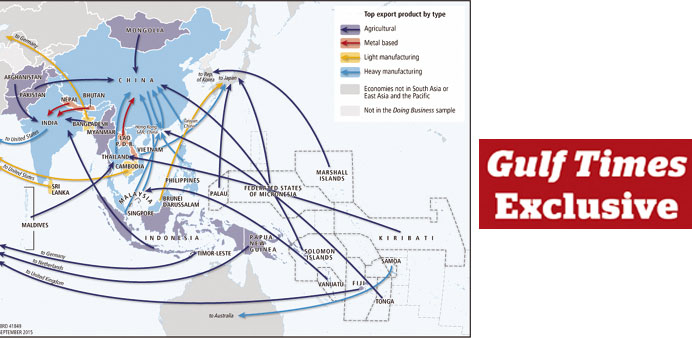By Arno Maierbrugger/Gulf Bank Correspondent/Bangkok
The new report “Doing Business 2016: Measuring Regulatory Quality and Efficiency” released by the World Bank on October 27 shows that the overall business environment in Asia-Pacific is improving steadily. The report found that most, though not all economies in the region managed to install reforms, mainly in the fields of paying taxes, getting electricity and registering property, which makes it easier for investors to set up or more efficiently run their businesses.
Top three nations in Southeast Asia remain Singapore, Malaysia and Thailand on ranks 1, 18 and 49, respectively. They were followed by Brunei (84), Vietnam (90), Philippines (103), Indonesia (109), Cambodia (127), Laos (134) and Myanmar (167).
While Malaysia maintained its position, Thailand dropped three notches on the list released in year one after the country’s military coup. From ten areas used for the annual ease of doing business measurement, Thailand showed an improvement only in the issuance of construction permits. Vietnam and the Philippines also dropped. The Philippine government suffered a major setback in its effort to simplify the process of starting and operating a business in the country. Among 10 key indicators, the Philippines only improved in terms of the time and cost required for a business to obtain an electricity connection for a newly constructed building.
Indonesia, instead, moved up the list a whopping 11 ranks, namely due to reforms in financing, registration and online tax payment. Indonesia now ranks 109 out of 189 countries in the list, which is a marked improvement from the 120 ranking of a year ago. There is, however, still a distinct difference between setting up shop in Indonesia and in the number one nation on the list, Singapore. For example, it takes 48 days to start a business in Indonesia, compared to just two and half in Singapore.
For this and many other reasons – particularly its “high-quality judicial processes” – Singapore remained on top of the annual ranking for 10th year in a row now. Other notable rankings in the Asia Pacific region this year are New Zealand (2), South Korea (4), Hong Kong (5), Taiwan (11) and Australia (13).
In the Middle East, the UAE tops this year’s list at rank 31 ahead of Bahrain (65). Qatar comes as a close third (68) ahead of Oman (70), Saudi Arabia (82), Kuwait (101), Jordan (113) and Egypt (131).
The report noted that 60% of the reviewed economies globally improved their business environment.
“It is heartening to see so many economies, particularly low-income economies and fragile states, undertaking reforms to improve the business environment. In time, this can result in increased job creation, economic growth and greater prosperity for their people,” said Rita Ramalho, Manager of the World Bank’s Doing Business project.
The report also impressively visualises the trade patterns in the Asia-Pacific region which is especially interesting ahead of such important trade pacts such as the Asean Economic Community and the Trans-Pacific Partnership.
The graph shows that China is absorbing the lion’s share of the region’s top exports, namely agricultural products, manufactured goods and metal-based commodities from Thailand, the Philippines, Malaysia and Laos, as well as Pakistan and Mongolia, showing the heavy dependence of these economies on China. Other nations, such as Cambodia, Bangladesh and Sri Lanka have much more intense trade ties with Europe and the US, while agricultural exports from Indonesia depend a lot on demand from India, the graph shows.

